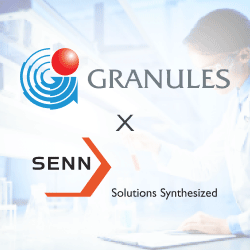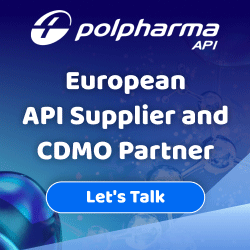Looking for drug solubility enhancement? Find a CDMO offering solubilization technologies for poorly soluble compounds & drugs on PharmaCompass.
Q1. What is drug solubility and why is it important?
Solubility is the property of a solid, liquid, or gaseous chemical substance called a solute to dissolve in a solid, liquid, or gaseous solvent to form a homogeneous solution. The solubility of a substance fundamentally depends on the solvent used as well as on temperature and pressure.
Drug solubility is defined as the amount of drug that passes into a solution when an equilibrium is established between the drug solute in solution and any excess, un-dissolved drug to produce a saturated solution at a specified temperature.
It is one of the important parameters to achieve the desired concentration of drugs in systemic circulation in order to elicit the desired (anticipated) pharmacological response. Drug solubility is thus considered a fundamental property that has to be evaluated in the early stages of drug discovery and formulation development.
Drug solubility depends on the pH, temperature, volume, and contents of the fluid. The lipophilicity of a drug is also correlated with water solubility. Structure determines the lipophilicity, hydrogen bonding, molecular volume, crystal energy and ionizability, which determine solubility. Whereas, solution conditions are affected by pH, cosolvents, additives, ionic strength, time and temperature.
Drugs with low water solubility are predisposed to low and variable oral bioavailability and, therefore, to variability in therapeutic response. If an orally administered drug is not sufficiently soluble, then it can not be fully absorbed into the blood circulation and will be expelled from the gastrointestinal tract before reaching its intended site of action.
Solubilization is the operation by which insoluble substances are introduced into the solution in ways that facilitate dissolution. Dissolution of drugs is the rate determining step for oral absorption and solubility and it is also a basic requirement for the formulation and drug development of different dosage forms.
A number of conventional and novel approaches can be adapted to improve the solubility of poorly water soluble drugs in order to further improve their bioavailability. Various techniques are used for the solubility and dissolution enhancement of poorly soluble compounds which include physical and chemical modifications of drugs and other methods, some of which are explored in detail in the third answer.
Importance of Solubility:
- Solubility is an important physicochemical property of a drug. It is essential to achieve the desired concentration of a drug in systemic circulation.
- The bioavailability of poorly soluble drugs is low due to reduced absorption. Increasing the solubility of such drugs can result in increased dissolution and hence bioavailability enhancement.
- Solubility can dictate the success or failure rate of drug discovery and drug development. In short, its measurement is pivotal for both in vitro and in silico evaluation of drug properties.
- Solubility plays an important role for the functioning of various dosage forms such as oral dosage forms and parenteral dosage forms (parenteral formulations).
Q2. What are some of the reasons for determining solubility?
Solubility is an essential and extensively studied preformulation parameter. As seen above, solubility is one of the most important factors that controls the formulation development of a drug. It is also important for achieving the required therapeutic efficacy of the drug. These reasons amongst various others make solubility assessment imperative.
Some Reasons For Determining Solubility:
- Solubility focuses on drug-solvent systems that could occur during drug delivery. It is important to determine solubility as it enables the best solvent medium selection, identification of challenges that arise during the formulation of solutions, and estimation of all known and significant impurities and contaminants.
- Recently, there has been a considerable shift in the solubility of pharmaceutical R&D compounds and drugs towards lower solubility. There is a clear trend towards more drugs falling into the category of BCS class II and IV, both of which have low solubilities. It is therefore important to determine solubility during the early stages of development, so one can apply appropriate solubilization technologies for solubility enhancement.
- Two types of solubilities are determined at different stages of drug discovery, kinetic solubility and thermodynamic solubility. Thermodynamic solubility is useful in deciding pharmaceutical development plans and options for formulation development and to confirm results obtained from kinetic solubility data.
- In comparison to bioavailability, solubility offers the advantage of representing a property which can be easily measured. Bioavailability refers to the extent and rate at which the active moiety enters systemic circulation, thereby accessing the site of action. As solubility increases so does the drug’s bioavailability.
- The solubility of drug candidates plays a vital role in selection of lead compounds in early stages of pharmaceutical development and drug discovery.
- Solubility determination is required at various stages of pharmaceutical development including the early development assay stage to ensure that the compound does not precipitate and give false-negative or false-positive results, for experiments prior to clinical trials that require compounds to be dissolved in suitable vehicles with suitable solubilities, etc.
- Oral ingestion is the most convenient and commonly employed route of drug delivery. However, the major challenge with the design of oral dosage forms lies within their poor bioavailability. The most frequent causes of low oral bioavailability are attributed to poor solubility and low permeability. Solubility determination is thus important for oral pharmaceuticals as it guides decision making for solubility and dissolution enhancement.
- Solubility plays a major role in parenteral formulations as well. Water solubility is an important molecular property for successful drug development of parenteral dosage forms as it is a key factor governing drug access to biological membranes. Numerous solubility enhancement techniques are being explored for parenteral formulations or parenteral dosage forms including nanocrystals, nanosuspensions, etc.
Q3. What are the different solubility enhancement techniques?
Solubility and dissolution enhancement can be achieved via both conventional and novel approaches, also referred to as advanced solubility enhancement. The various solubility enhancement techniques used for improving the solubility of poorly soluble drugs include physical and chemical modifications and other methods like particle size reduction, solid dispersions, use of surfactants, complexation, etc.
Some Solubility Enhancement Techniques / Solubility Enhancement Methods:
Particle Size Reduction
Particle size reduction is one of the oldest strategies for improving the solubility of drugs since solubility of drugs is intrinsically related to drug particle size. As particle size decreases, the surface area per unit volume increases which results in increased solubility.
Particle size reduction solubility enhancement technologies are therefore routinely used to improve solubility and hence the bioavailability of poorly soluble drugs. Various conventional and novel approaches are used for particle size reduction.
- Micronization
Micronization does not increase the equilibrium solubility of the drug itself but it increases the dissolution rate by increasing the surface area to drug ratio by which the Active Pharmaceutical Ingredient (API) can dissolve or diffuse from the drug particles.
- Nanosuspensions
Nanosuspensions consist of a pure, poorly water soluble drug without any matrix material suspended in a dispersion. A nanosuspension not only solves the problems of the solubility and bioavailability of poorly soluble drugs, but also alters the pharmacokinetics of drugs and thus improves drug safety and efficacy.
Solid Dispersions
The term solid dispersion refers to the dispersion of one or more active ingredients in a hydrophilic inert carrier matrix at a molecular level. Solid dispersion (SD) has been widely used to improve the dissolution rate, solubility, and oral absorption of poorly water soluble drugs.
- Spray Drying
Spray drying is the process by which a liquid is transformed into dried particles by spraying the feed into a hot drying medium. Spray drying is a continuous and scalable solvent evaporation method. It converts solutions to powders in a single process, and it has been used for the preparation of amorphous solid dispersions (ASDs) of poorly soluble compounds.
Lipid Based Delivery Systems
Lipid based delivery systems are drug delivery systems containing a dissolved or suspended drug in lipidic excipients. One or more surfactants, as well as perhaps a hydrophilic cosolvent, may be required to aid solubilization and to improve dispersion properties of lipid formulations. Lipid based delivery systems are one of the emerging solubility enhancement technologies or solubilization technologies designed to address challenges including the solubility and bioavailability of poorly soluble drugs.
Complexation or Complex Formation
Complexation is the process of complex formation which involves characterizing the covalent or non-covalent interactions between two or more compounds. The solubility of a precipitate can be improved by adding a ligand capable of forming a soluble inclusion complex with one of the precipitate ions. For example, cyclodextrin complexation or complex formation leads to a significant increase in water solubility of the drug compared to an uncomplexed drug.
Solubility Enhancement Excipients
Poorly water soluble drugs are a major issue for the pharmaceutical industry. By using solubility enhancement excipients pharmaceutical formulators can increase the oral bioavailability of poorly water soluble compounds. Advanced solubility enhancement excipients can help companies bring products to market faster.
Q4. Which are the leading pharmaceutical companies offering solubility enhancement contract services?
Various pharmaceutical organizations equipped with solubility enhancement technologies to improve the solubility of poorly soluble drugs offer solubility enhancement services to the pharmaceutical industry. Some of them and the solubility enhancement techniques they offer for the formulation development of poorly soluble drugs are noted below.
Leading Pharmaceutical Companies Offering Solubility Enhancement Services:
Adare Pharma Solutions - Solubility Enhancement Services
Adare is a technology-driven CDMO with specialized technology platforms that provide taste masking, controlled release, solubility enhancement, and patient-centric dosing solutions. Adare provides solutions that improve drug absorption and bioavailability to address the challenges of poorly soluble compounds.
Their pharmaceutical oral solid formulations can offer effective oral dosing of poorly soluble drug candidates, equivalent therapy at lower doses, faster onset of action, and minimization of food effects. The bioavailability and solubility enhancement technologies provided by Adare include Diffucaps® solid solutions or solid dispersions.
Curia - Solubilization Technologies to Improve Solubility
Curia offers formulation development services for liquid and solid dosage forms. Curia's complete suite of services include comprehensive solid state characterization and ongoing support, solubility enhancement for improved dosing performance, etc. Utilizing specialized technology, Curia’s skilled experts can offer formulation development of poorly soluble drugs.
Quotient Sciences - Solubility-enhanced Drug Development
Quotient has established a broad suite of solubility enhancement technologies and formulation approaches to address complex solubility challenges. Their approach allows them to dramatically speed up the optimization of drug products and improve the oral bioavailability of poorly water soluble compounds. It thus offers the formulation development of poorly soluble drugs.
Quotient has advanced solubility enhancement capabilities and provides solubility-enhanced dosage forms including amorphous (spray-dried, HME) dispersions in bottles, lipidic vehicles such as self-emulsifying and microemulsifying drug delivery systems, micronized Active Pharmaceutical Ingredients (APIs) in bottles, etc.
Athena Pharmaceutiques - Solubility Enhancement Methods
Athena has been dedicated to developing lifecycle products and has developed a broad range of technology platforms for oral drug delivery with a special focus on modified release formulations, orodispersible and other pharmaceutical oral solid dosage forms.
Athena offers solubility enhancement methods and is also specialized in improving the oral bioavailability of poorly water soluble compounds falling under the BCS II category by using special solubilizers and micronization. Using its EzSol platform, Athena is able to improve bioavailability, efficacy, onset of action, etc.
Eurofins CDMO - Solubility Screening Studies
Eurofins CDMO (Contract Development and Manufacturing Organization) provides integrated, end-to-end solutions for preclinical and clinical outsourcing services for both drug substances and drug products including pharmaceutical oral solid dosage forms.
Eurofins also offers fast and accurate solubility screenings in a large number of solvents while using minimum materials and solvents for starting materials, intermediates and Active Pharmaceutical Ingredients (APIs), by utilizing high-throughput robotic technology.
All Suppliers












 AbbVie CDMO has been working with global companies to develop, manufacture & scale biopharmaceutical products.
AbbVie CDMO has been working with global companies to develop, manufacture & scale biopharmaceutical products.







